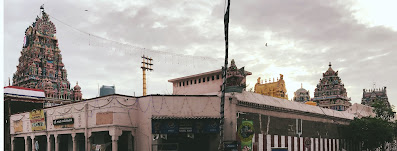Thursday, August 29, 2019
Tirupullani Temple
Sunday, July 15, 2018
Unique Divya Desam
Tuesday, July 3, 2018
Sri Parthasarathy Temple
Monday, July 2, 2018
Parikkal Sri Lakshmi Narasimhar
When the Four Brahma Kumaras (they were Manasa putras, meaning born out of the mind of Lord Brahma) - Sanaka, Sanandana, Sanatana and Sanatkumara came to visit Sriman Narayana at Vaikunta, His bodyguards Jaya-Vijaya refused them entry stating that the Lord was resting. Outraged, they cursed them to be out of the celestial world. The duo reached the Lord’s feet and sought mercy, however the Lord himself could do little about this curse. However, He gave them two choices. Either be born as a devotee in seven births or be born as an Asura in three births to fight the Lord Himself. That the duo couldn’t stay away from the Lord for seven births, they were born Asuras - In Krita Yuga as Hiranyaksha (killed by Lord Maha Vishnu's 3rd Avatara as Varaha) and Hiranyakashipu (story below).
 |
| Temple View - Parikkal |
Why visit Temples?
For the inquisitive minds, this note provides a little insight on Brahmam and the main purpose of worship and visiting temples.
Why do we visit temples?
We visit temples to worship God. Brahmam (Sriman Narayana) has five different forms.
While God is infinite and beyond the limits of space, time and form, he takes various forms for different purpose.
Let us understand the five different places and forms of God and the purpose of each of these forms.
1st form - Para Roopa
The form HE takes at Sri Vaikunta, His Celestial Abode.
Description
In seated posture, to His right is Sri Mahalakshmi and to his left is Bhooma Devi and Neela devi. Along with Him are billions of Nitya aatmas and Mukta aatmas having great experience and spiritual bliss at Sri Vaikuntam.
Attribute
Exhibits Supremacy
2nd Form - Vyuha Roopa
The form HE takes in the Milky Ocean (Ksheeraabdi)
Description - Here, HE is in the reclining posture. Whenever the Devas have a tough time with Asuras, they rush to Ksheeraabdi. God listens patiently to all their complaints and the lament of the Devas and only "if needed" HE incarnates from Ksheerabdi to help the Devas and protect his devotees.
Attribute
Exhibits as the ultimate Saviour (Rakshakatvam)
3rd Form - Vibhava Roopa
HIS various incarnations on Earth for us mortals.
Description
His incarnations are countless which includes the Dasa Avataara. The purpose of HIS incarnations are; 1). To award and protect the ones who follow the rule book (Dharma Shastra), 2). To punish the ones who do not follow and 3). To establish Dharma.
Paritraanaaya Saadhoonam, Vinaashayacha Dushkrutaam, Dharma Samstaapanaartaya, Sambhavaami yuge yuge
Attribute
Exhibits Dharma Samstaapanam
4th Form - Antaryaami
Residing inside each of us (inside all Jeeva aatmas)
Description
HE dwells in our heart, which is in the form of inverted lotus. HE is quite close to us, watching us all the time, even when our mind is engaged in material matters. HE is steadfast, ever pardoning and waiting for the right moment to correct us.
Attribute
Exhibits magnanimity (Vaatsalyam) in this form
5th Form - Archaa
The deity form which is the most important and useful form for us on Earth.
Description
God resides in deity form in standing, sitting or reclining postures. We, as human beings, do not know the route to Sri Vaikunta, nor do we live in the Krita, Treta or Dwapara yugas to see His incarnations. God resides in each of us, quite intimate and close, but we have not attained the state of Yogi to meditate and realise the One who dwells in us. So, unless HE is available and accessible for us, we can not meditate on HIM, worship and exhibit bhakti. So HE is available in deity form in temples all the time, close to our homes, accessible, for us to worship.
Attribute
Exhibits simplicity and accessibility (Soulabhya) in this form
The next question is why worship God?
God gives us anything we ask for when we completely surrender unto Him. While HE grants all the material pleasures we ask for, HE is the only one who can help us achieve the supreme goal which is to realise the ultimate purpose of life.
Let us ask ourselves some basic questions:
Who am I?
I am a Jeevaatma (There is no difference between me, a sheep, a flower, Devas or any other Jeevaatmas).
What differentiates Jeevaatmas?
Intelligence (Gyana) which is accumulated based on our actions (Karma) over several births.
Who is God?
Paramaatma (the one who is eternal, infinite and supreme of all).
What is the ultimate purpose of my life?
To attain moksha and realise the Brahmam (experience eternal bliss and cut out from the cycle of birth and death)
While it is easy to put this in a para-form, it is not easy to experience and appreciate Brahmam without Surrender to Him and experience HIS various forms.
The simple beginning would be to visit the closest temple, mediate and worship on HIM.
Monday, June 25, 2018
Uchhi Pillaiyar – Trichy
How to reach:











